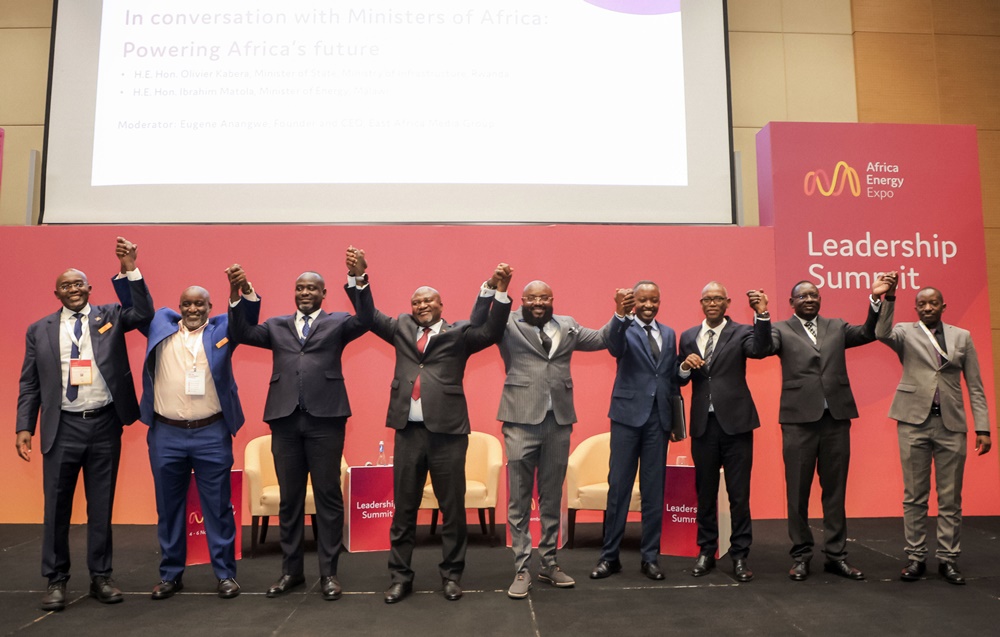News & Events Details

Oct
Government launches US$35 million solar project for rural households
Kigali, 3rd October 2020: Minister of Infrastructure, Honourable Claver Gatete officially launched the Subsidy Window and the Guarantee Framework as part of the Renewable Energy Fund (REF) Project. The venture aims at connecting at least 445,000 households with solar energy, where about 1.8 million people will benefit from this project.
The US$ 15million REF Subsidy window is a newly created facility to address the affordable issue for solar home systems for off-grid households while the other is a $20 million guarantee framework covering lending institutions.
During the launch, Minister Gatete noted that the Government of Rwanda considers energy as one of key sectors that will stimulate the development of the country as reflected in the National Strategy for Transformation (NST1) which sets out as a target universal access to electricity for all the Rwandans by the year 2024. It is planned that the 52% of the energy will come from the grid and 48% from off grid.
Minister, emphasized on the role of the private sector and development partners as a vital tool in achieving 100% access target by 2024.
The infrastructure minister appreciates the interest of private sector players and financial institutions to drive REF financing instrument and commends their strong collaboration in energy sector development.
“Today, we are at 56% access, where 40% is on grid and 16% off grid. This indicates a huge gap in achieving the off-grid target of 48% by 2024 and that is why partnership with private sector and other development partners is vital”, he added.
For off-grid targets to be achieved, the Government of Rwanda through the support of Climate Investment Fund (CIF) has secured USD $ 49 million with the objective of providing electricity through off grid solutions such as standalone solar home systems and mini grids.
The Chief Executive Officer of the Development Bank of Rwanda (BRD), Mrs. Kampeta Pitchette Sayinzoga said that the products were designed to address affordability of solar home systems which the lower-income population and solar companies identified as a key hindrance.
Since its establishment in 2017, only 6 per cent of REF loans were exploited and the experts attribute the low utilization to issues of affordability of solar systems, limited collaterals for loans and weak marketing.
“We had previously been observing a low uptake of the loans among the intended beneficiaries in the rural areas, so we had to act fast to ease the challenges of affordability and securities or collateral,” Sayinzoga said.
As a response to low levels of awareness of the fund across the market, an agreement was also signed between BRD and selected saving-lending cooperatives to boost demand for solar home systems through Deal Origination Agencies (DOAs).
The partial grant schemes are financed by the World Bank, the Swedish International Development Cooperation Agency (SIDA) and Belgium’s Enabel.
The subsidy facility will be offered to eligible households living in off-grid areas. Beneficiaries from Ubudehe 1 category will be subsidised by 90 per cent, Ubudehe 2 by 70 per cent and Ubudehe 3 by 45 per cent. The guarantee scheme will cover lending risks on loans provided by financial institutions to households as well as small and medium enterprises.
As opposed to what has been the practice, clients now will not need to pledge their property as collateral. To benefit from either scheme, citizens approach lending institutions or solar companies to apply for solar loans while institutions apply at BRD for a maximum of US$1 million per institution. Applications are open until March 2021 and the schemes will last three years.
Categories
Archives
- November 2024
- October 2024
- September 2024
- July 2024
- May 2024
- April 2024
- March 2024
- August 2023
- July 2023
- June 2023
- May 2023
- April 2023
- February 2023
- December 2022
- August 2022
- July 2022
- June 2022
- May 2022
- April 2022
- March 2022
- February 2022
- January 2022
- December 2021
- November 2021
- September 2021
- August 2021
- July 2021
- June 2021
- May 2021
- April 2021
- February 2021
- January 2021
- December 2020
- November 2020
- October 2020
- September 2020
- August 2020
- July 2020
- June 2020
- April 2020
- March 2020
- February 2020
- January 2020
- December 2019
- November 2019
- October 2019
- September 2019
- August 2019
- July 2019
- June 2019
- May 2019
- April 2019
- March 2019
- February 2019
- January 2019
- December 2018
- November 2018
- October 2018
- September 2018
- July 2018
- June 2018
- April 2018
- March 2018
- February 2018
- January 2018
- December 2017
- November 2017
- August 2017
- July 2017
- June 2017
- March 2017
- February 2017
- January 2017
- December 2016
- November 2016
- August 2016
- July 2016
- June 2016
- April 2016
- February 2016
- May 2015
- April 2015
- March 2015
- January 2015
- December 2014
- August 2014
- July 2014
Related News
Our Partners
Please fill in the form or Call us on our Toll free number 2727























